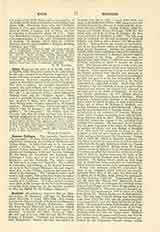

Rioja, FRANCISCO DE, poet, b. at Seville, 1583; d. at Madrid, 1659. Rioja was a canon in the cathedral at Seville and a member of the Supreme Inquisition. His poems will keep his name forever remembered by, his countrymen. Quintana considers them the first attempts at descriptive poetry in the Castilian language. The style is original, the thoughts beautifully expressed the taste refined, and the versification well adapted and harmoniously blended with the theme. The ode “A las ruinas de Italia”, which belongs to Rodrigo Caro, and the “Epistola moral”, whose author is probably Francisco de Andrada, were, until late, ascribed to Rioja, who, although despoiled of these literary gems, is highly esteemed by all Spanish scholars. Menendez y Pelayo felicitously writes that Rioja’s “Ode to Summer”, and those “To Tranquility”, “To Constancy,” “To Riches” and “To Poverty” are, after the lyrics of Fray Luis de Leon, the best moral odes of the Castilian poetical treasure.
WILLIAM FURLONG

